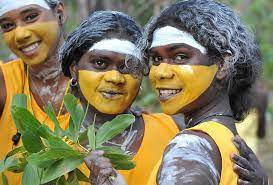Posted on May 31, 2022
This is an update of my post published on May 31, 2011:
 |
| Aboriginal Australians |
This year, the theme of Reconciliation Week is “Be Brave. Make Change.” It’s about helping to “collectively build relationships and communities that value Aboriginal and Torres Strait Islander peoples, histories, cultures, and futures.”
Cooee!
Many Aboriginal words are familiar to English speakers because they have have actually been adopted into the English language. Some of the names for animals are among my favorite words in the world: dingos, kangaroos, potoroos, wombats, wallabies, koalas, and kookaburras.
Strangely, the word didgeridoo is not an Aboriginal word, even though it names an Aboriginal musical instrument. There are a variety of Aboriginal words for the instrument, including yadaki. The word didgeridoo is of Western origin and could be onomatopoetic—in other words, copying the sound that the didgeridoo makes.
I also thought that bandicoots and emus, Australian animals, got their names from Aboriginal languages, but in actual fact bandicoot comes from Teluga (a language of India), and emu from Arabic. Of course, there are lots of Australian slang words that are not Aboriginal in origin!
Here is a famous Kookaburra song, and here is another famous Australian bush song, “Waltzing Matilda.” (Warning: the latter song tells a sad story that can be upsetting to some.)
Check out last year’s post.
Also on this date:
Plan ahead:
Check out my Pinterest boards for:
-
June holidays
-
June birthdays
-
Historical anniversaries in June





















